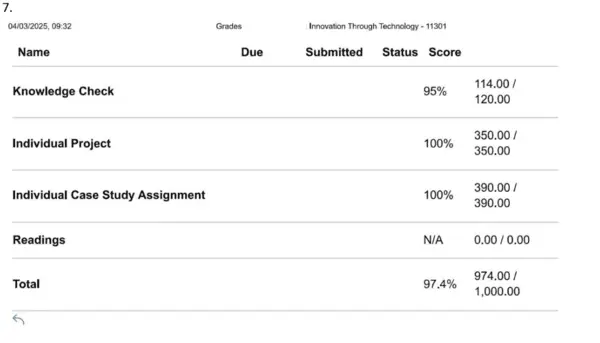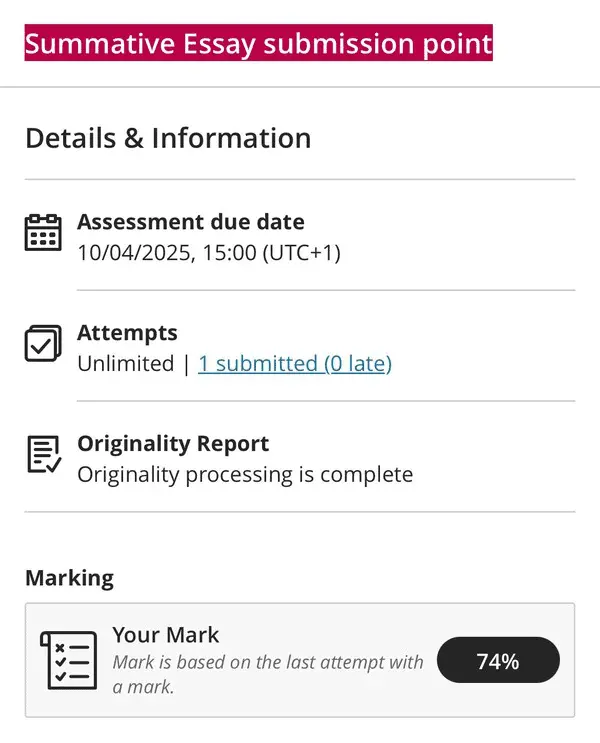Philosophy Dissertation Topics & Ideas
Philosophy Dissertation Topics by Native Assignment Help
Ph.D. Experts For Best Assistance
Plagiarism Free Content
AI Free Content
Need Philosophy Dissertation Topics Fast? Hire Experts Available 24/7!
Are you looking for experts to assist you? We have 500+ experienced writers from different fields and expertise with one goal: to help students excel.

I bring over ten years of experience supporting UK university students, having taught and supervised coursework and dissertations at the University of Leeds and King’s College London. I hold a PhD in marketing and specialise in strategic marketing theory, consumer behaviour, and case study methodology. I ensure structured analysis, evidence-based arguments, and compliance with UK Level 6–7 marking standards, providing fully plagiarism-free guidance that reinforces academic rigour and research integrity.

Hey there, Learners! I’m Lucian Jones, born and raised in London, United Kingdom, and I’ve got a serious Knack for crafting top-tier management papers. For the past six years, I've been working in the team of Native Assignment Help as an expert to help students with those tricky dissertations, essays, and case studies that make you go, “Where do I even start?" Academics are my passion, and management studies are my zone. I enjoy turning complicated theories into clean, sharp papers that actually sound smart and score big.

I am Felix, a well-known academic expert with a PhD in healthcare studies with an impressive record of A+ in all semesters. That is why I have chosen academic guidance as a way to reach helpless students in various subjects.

Dear students, it's your expert, Calliope Abbott, for management studies. I have worked with students of Manchester University, Oxford, Birmingham, the University of London, Imperial College, etc. This is where my expertise also lies; I’m known for guiding on UK university-specific management assignments. I’m aware of universities' marking criteria, their guidelines and what professors expect from students. Students always ask me how I meet the academic standards so perfectly. I believe a person should know about the field s/he are working in, and I’m the master of my field.
Our order process is simple Three easy steps!
-
Please provide all your requirements with us by ‘Order Now’ form and specify the topic of the assignment, deadline date, word count, etc.
-
We use highly secured payment gateway to protect our clients from online fraud activities. Pay using any of these options like PayPal, online banking, Mastercard, and Visa (debit/credit cards).
-
Our experts will do the assignment as per the requirement you shared and will try to deliver before deadline.
List of Philosophy Dissertation Topics
| Dissertation Topics | Research Focus & Rationale |
| Moral Agency in Artificial Intelligence | Can autonomous AI systems be considered moral agents?. |
| Care Ethics in Automated Welfare Systems | Feminist critique of algorithmic social care. |
| Epistemic Injustice in Algorithmic Decision-Making | AI bias as testimonial injustice against marginalized groups. |
| Transhumanism and Cognitive Enhancement Ethics | Implications of Brain-Computer Interfaces (BCI). |
| Rights of Future Generations and Climate Action | Contractarian defence of obligations to the unborn. |
| Political Epistemology in the Age of Deepfakes | Challenges to democratic truth and deliberation. |
| Consciousness and Sentience in LLMs | Critique of "spark of consciousness" claims in AI. |
| Virtue Ethics for Digital Citizenship | Cultivating character in online interactions. |
| Ontology of Virtual Objects in the Metaverse | Real vs. virtual status of digital goods. |
| Predictive Algorithms and the Concept of Free Will | Does prediction undermine autonomy?. |
| Ethics of 'Nudging' in Public Policy | Paternalism vs. liberty in behavioral economics. |
| Corporate Moral Responsibility and Agency | Can organizations be blamed like individuals?. |
| Privacy as a Natural Right in the Surveillance Age | Re-evaluating privacy foundations. |
| Neurodiversity and the 'Normal' Mind | Philosophical implications of the neurodiversity paradigm. |
| Just War Theory and Autonomous Weapons | Morality of lethal autonomous systems (LAWS). |
| The Ethics of the Attention Economy | Commodification of attention as a moral wrong. |
| Modern Stoicism: Philosophy or Life Hack? | Critiquing the commercialization of Stoicism. |
| Conflict between Animal Rights and Environmentalism | Ethics of culling invasive species for ecosystem health. |
| Philosophy of Migration: Borders and Belonging | Ethical analysis of the state's right to exclude. |
| The 'Is-Ought' Problem in AI Value Learning | Can AI learn values without committing naturalistic fallacy? |
| Metaphysics of Time: Presentism vs. Physics | Reconciling philosophical time with relativity. |
| Feminist Epistemology and Scientific Objectivity | Critiquing the "view from nowhere". |
| Ethics of Solar Geoengineering | Moral hazard and risk in climate intervention. |
| Meaning and Understanding in AI Language Models | Searle's Chinese Room in the era of GPT-5. |
| Epistemic Authority of Expert Systems | Rationality of trusting AI over human experts. |
What is a Philosophy Dissertation?
Philosophy is the most unique and interesting subject for students. This subject awakens their critical thinking through independent assignments like dissertations. A philosophy dissertation is a compilation of research and writing a thesis on research topics. The more innovative topic a student chooses, the more engaged they will be and the more marks they will secure.
The thing about dissertations is that they should be properly formulated within the requirements provided by universities.
Basic components of every Philosophy Dissertation Topics
- A Powerful topic: The dissertation topic is the limelight around which your philosophy dissertation revolves. It should be impactful, unique and relatable. When choosing a philosophy dissertation topic, some factors like religious beliefs, ethical dilemmas and historical philosophy should be considered.
- Table of Contents: This table of contents is a sequential arrangement of headings, tables, images and graphs you will portray in your dissertation. This forms an outline of your thesis and gives a brief idea of your dissertation content.
- Introduction: The introduction is where the actual writing part begins. Here you need to define your topic in a detailed manner. It entails the summary of the complete dissertation and an overview of all the points that will be discussed further in the thesis.
- Review Literature: In this part of the dissertation, research and comments made by other authors are mentioned and discussed. This forms a base for your research. Don’t limit to one author or article. Research and include all the relatable publications to broaden your presentation.
- Methodology: To reach to correct conclusions, you need to use the most appropriate methodologies. You can take guidance from other research papers to conduct practicals. This includes a collection of data and analysis to justify your study and results. You can use graphs and images to make it more attractive and realistic.
- Observation: After you have mentioned your findings, you need to present your observations and personal insights. Your observation should align with the demands of the topic. Your observations should be specific unique, and add value to research.
- Conclusion: The last writing part is the conclusion. Here you need to give ending notes. In a philosophy dissertation, you are expected to give your professional opinion at the end of the research. You will be assessed based on your skills and contributions to the research.
- Citations: Here you need to add in all the references you took for completion of your dissertation. This is a professional way of safeguarding your dissertation from plagiarism.
- Appendices: This appendix includes all the additional things you used in your dissertation. This included images, graphs and tables. You also need to mention the content related to it.
Importance of Valuable Ideas for Philosophical Theses
Here are some reasons which make philosophical dissertation ideas the most crucial part of the dissertation-
- Good Content: If you own a good dissertation topic, you will automatically get your hands on the best content. A topic is considered of the best quality only when it is popular, easy to research and has future scope. Hence if you have such good topics, your content will outshine you too.
- Creates a great impact: The first thing that is noticed in your assignment is your topic. It portrays how much subject knowledge you have in philosophy. With your dissertation topic, your research and analytic skills come to light. Hence a topic plays an important role in welcoming grades for students.
- Discover your interests: While studying doesn’t give much freedom to discover your interest, a philosophy dissertation simply can. It allows you to explore different topics and recognize which area interests you the most. Your choice of topic can help you decide your career path as well.
- Future Benefits: A philosophy dissertation counts as a professional experience. Your topic creates an identity for you in the field of philosophy. It also counts as professional experience in creating a career. You can use your dissertation topic in further research work as well.
How to choose a Good Dissertation Topic For Philosophy?
Here are various pointers for choosing the right dissertation research idea in philosophy -
- Choose a direction for your topic: Philosophy has many amazing topics to write a thesis. But what matters is what interests you. If you stick to your favorable philosophy topic, it will keep you engaged. Recollect all the topics that have inspired you and try to find research work done around it.
- Read Philosophy articles: Start looking for published articles on the web. Find loopholes or parts which require more study and research. You can use them as your dissertation topic. Such topics are considered best by professors and good grades are given to them.
- Check Content Trendiness: You should select a topic that has gained popularity in academics. A trending topic has good availability of content. When you research for content, you will have multiple sources published by renowned authors.
- Seek Future Prospective: The dissertation topic that you select must have a good scope in the future. Research topics that will answer many philosophical cliffhangers. If your topic has good futuristic potential you will get good recognition among academic scholars.
- Consult your Advisors: When you are confused between several topics, seek guidance from your advisors. They will help you to choose the most suitable topic for you. Consulting teachers at an early stage can also help you create a path for the rest of your philosophy dissertation.
Get Custom Dissertation Help Now!
Why choose Native Assignment Help as the best solution?
Choosing a philosophy dissertation can become easier if you have experts as your helping hand. Our Assignment Help company curates the best philosophy dissertation topic for you. Our PhD experts never fail to submit unique, powerful and custom philosophy dissertation topics. Your writing needs can take a rest, now that are reliable services are on your side. We want to provide genuine guidance and inspiration among students to score the best grades.
-
How do you choose a dissertation topic in philosophy?
Choosing a dissertation topic in philosophy involves reflecting on interests, exploring current issues, consulting an advisor, assessing feasibility, ensuring originality, conducting preliminary research, seeking feedback, seeking permission, developing a plan, and maintaining enthusiasm.
-
How do you start a philosophy dissertation?
To start a philosophy dissertation, identify your research question, conduct thorough preliminary research, define your methodology, identify relevant sources, develop a strong argument, write a compelling introduction, present a thorough literature review, develop a solid body of evidence, engage with opposing views, write a cohesive conclusion
-
How long is a typical philosophy dissertation?
A typical philosophy dissertation typically falls between 150-250 pages in length, allowing for sufficient depth and detail to address complex philosophical questions while maintaining a manageable length for the reader.
Student Success Stories with Real Results See how our expert-written assignments help students achieve top grades. We utilize cookies to customize your experience. By remaining on our website, you accept our use of cookies.
View Detail








